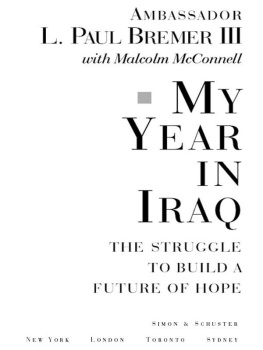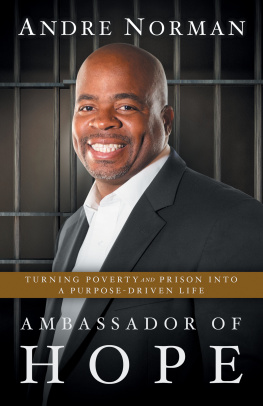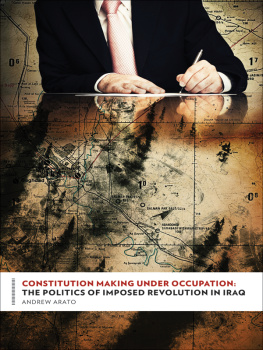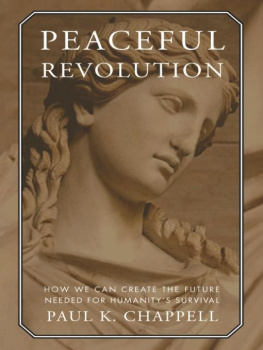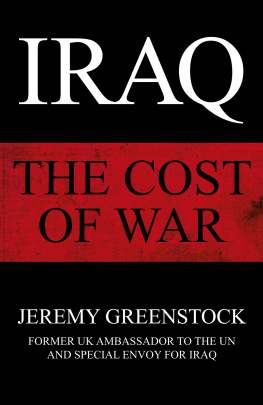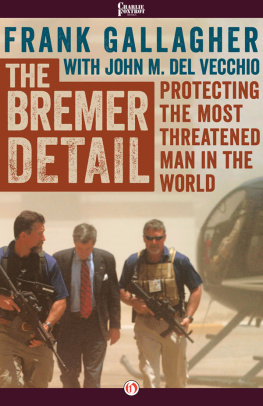Ambassador L. Paul Bremer III - My Year in Iraq: The Struggle to Build a Future of Hope
Here you can read online Ambassador L. Paul Bremer III - My Year in Iraq: The Struggle to Build a Future of Hope full text of the book (entire story) in english for free. Download pdf and epub, get meaning, cover and reviews about this ebook. year: 2006, publisher: Simon & Schuster, genre: Politics. Description of the work, (preface) as well as reviews are available. Best literature library LitArk.com created for fans of good reading and offers a wide selection of genres:
Romance novel
Science fiction
Adventure
Detective
Science
History
Home and family
Prose
Art
Politics
Computer
Non-fiction
Religion
Business
Children
Humor
Choose a favorite category and find really read worthwhile books. Enjoy immersion in the world of imagination, feel the emotions of the characters or learn something new for yourself, make an fascinating discovery.
- Book:My Year in Iraq: The Struggle to Build a Future of Hope
- Author:
- Publisher:Simon & Schuster
- Genre:
- Year:2006
- Rating:3 / 5
- Favourites:Add to favourites
- Your mark:
- 60
- 1
- 2
- 3
- 4
- 5
My Year in Iraq: The Struggle to Build a Future of Hope: summary, description and annotation
We offer to read an annotation, description, summary or preface (depends on what the author of the book "My Year in Iraq: The Struggle to Build a Future of Hope" wrote himself). If you haven't found the necessary information about the book — write in the comments, we will try to find it.
My Year in Iraq: The Struggle to Build a Future of Hope — read online for free the complete book (whole text) full work
Below is the text of the book, divided by pages. System saving the place of the last page read, allows you to conveniently read the book "My Year in Iraq: The Struggle to Build a Future of Hope" online for free, without having to search again every time where you left off. Put a bookmark, and you can go to the page where you finished reading at any time.
Font size:
Interval:
Bookmark:
Since the events described in this book, there have been significant developments in Iraqs struggle to build a new nation with a future of hope.
Defying terrorists and pundits alike, Iraqis by the millions voted in the countrys first truly democratic elections in January 2005. Who can forget the moving image of thousands of Iraqi men and women waving their purple-stained fingers in pride? Nothing could better illustrate the thirst for self-government felt by the vast majority of the Iraqi people. Fully 31 percent of the deputies elected were women, one of the highest percentages in the world (and twice that in the U.S. Congress).
The terrorists and other antidemocratic forces recognize the threat to them posed by self-governing Iraqi citizens. And so they have stepped up their attacks on the very people they seek to rule. The terrorists will not succeed because the Iraqi people and their allies will not allow it.
Recently, voices have been heard in America calling for the withdrawl of our forces or for setting a clear deadline for their return to the U.S. This would be an historic mistake, only serving to encourage the terrorists to wait us out before renewing their attacks. It would signal a defeat for Americas interests, not just in Iraq, but in the wider region. Terrorists everywhere would take heart.
What is at stake is far more than Iraqs future, for the elections in early 2005 stirred democratic winds throughout the region. It is in Americas interest to fan those winds because responsible self-government is the best long-term antidote to the hatred and warped vision of the terrorists.
President Bush, addressing the United Nations in September, put the case very clearly, Either hope will spread or violence will spread, and we must take the side of hope.
Finally, a personal message to the men and women of Americas armed forces: During my time in Iraq, I was constantly impressed by your courage and steadfast dedication. You liberated Iraq from Saddams tyranny and then helped the Iraqi people reclaim their country, whether by fighting the insurgents and terrorists or by rebuilding schools and orphanages. You, and Iraqis of all sects and ethnic backgrounds, have paid a very high price in this fight. Hard as the job has been, you can take comfort in knowing that you have done a noble thing.
But there is no quick, easy path to renewing a society like Iraqs, recovering from decades of brutality. We must honor your sacrifices by showing the patience and determination to finish the job.
It is difficult, writing a book, to know where to begin to thank the people without whose help it would not have been possible.
I suppose the best place is to begin at the beginning and to thank my wonderful agent, Marvin Josephson. It was he, on a visit to Baghdad, who first suggested that I write this book. So readers disappointed that I have followed his advice should take their grievance to Marvin.
To me, however, Marvin was a gift. I thank him for his help identifying a publisher and willingness to give sound advice on the book as the writing proceeded. And I am further indebted to him for suggesting that I engage Malcolm McConnell as my collaborator on the project.
My sincere thanks to Malcolm for his extraordinary energy and insight. He came to the project with the perfect backgroundformer diplomat, experienced author, and sensible man. Malcolm is an excellent writer and has become a good friend. He also brought to bear his secret weapon, his wife, Carol. She somehow succeeded at the near-hopeless task of keeping us organized.
Alice Mayhew lived up to her reputation as one of the countrys best and most experienced editors. I am deeply grateful for her constructive and thoughtful comments on the structure and content of the book. She also mobilized the considerable resources of the publisher, Simon & Schuster. I particularly want to thank Tom Pitoniak for his perceptive copyediting and Serena Jones for her indefatigable support.
The story told here would not have been possible without the heroic men and women of the American armed forces and my former colleagues in the Coalition Provisional Authority.
These civilians, all of them volunteers, served in a stressful and dangerous environment, working 1820 hours a day to help the Iraqi people reclaim their country. It was the most extraordinary group of dedicated individuals I have ever worked with. I thank them from the bottom of my heart.
I note with great sadness that my close friend and invaluable counselor, Hume Horan, died before this book was published.
My special thanks to former colleagues who helped me with the research on this book and who gavesometimes rather freelytheir advice on how to improve it. Wherever I have fallen short of their high standards, I myself am to blame.
Thanks to you: Muean Aljabiry, Rodney Bent, Scott Carpenter, Scott Castle, Christina Estrada, Mounzer Fatfat, Matt Fuller, Peter Gibson, Bob Gifford, David Gompert, Tom Foley, Reuben Jeffery, Dick Jones, Roman Martinez, Brian McCormack, Don Hamilton, Clay McManaway, Peter McPherson, Scotty Norwood, David Oliver, Meghan OSullivan, Chris Ross, Ed Schmults, Dan Senor, Walt Slocombe, Gene Stakhiv, Hugh Tant, Gary Vogler, and Alex Zemak. Your contributions to this story, both before and after we left Iraq, were remarkable.
A very special thanks to my long-time colleague and friend Sue Shea. Following an unfathomable calling, she came to Baghdad on a moments notice to work for meyet again. Somehow, through the tensions and chaos of life there, she brought a measure of calm and organization.
My thanks to my children and their spouses. They set aside misgivings they might have had about the dangers inherent to my mission and showed me, in a hundred ways over the fourteen months, how love can conquer distance.
Finally, to Francie: wife of thirty-nine years, loving mother of our children, experienced author, wise counselor, and love of my life. Her steadfast courage throughout the long months of this story was just the latest example of her strength and faith. God bless you, Francie!
Abdullah II, King of Jordan
Abizaid, John
Allawis meeting with
Bremers meeting with, (Nov. 7, 2003)
Bremers phone calls with
Fallujah crisis and
at G-7 meeting
Muqtada rebellion and
at NSC meetings
police training and
Saddams capture and
in teleconferences
troop withdrawals and
Abu Ghraib Prison
abuse scandal and
Abu Hatem
see also Muhammadawi, Abdul Karim al-
Ad-Dwar
Adnan, Ali
Afghanistan
Bremer in
Iraqi constitution and
UN special representative to
Air Force, U.S.
Al-Anbar Province
see also Fallujah
Al-Hillah
mass graves in
Muqtada rebellion in
textile factory in
Ali, Imam Hussein ibn
shrine of
Ali bin Hussein, Sharif
Aljabiry, Muean
Al-Jazeera
Fallujah crisis and
Alkadiri, Raad
Al-Kut
Allawi, Ali
Allawi, Ayad
as defense minister candidate
early transfer of sovereignty and
as GC president
interim government presented by
as prime minister
as prime minister candidate
Al-Qaeda
Amara
Anaconda strategy
Anbaky, Nazar al-
Anfal operation
Annan, Kofi
Arbaeen holiday
Armitage, Rich
Army, Iraqi see Iraqi Army
Army, U.S.
Fallujah shootdown and
Iraqi police training and
troop rotation and
see also specific units
Army Corps of Engineers, U.S.
Ashura attacks
Assad, Bashar
Assad, Hafiz
Assyrian Christians
Australia
Awadi, Rassim al-
Font size:
Interval:
Bookmark:
Similar books «My Year in Iraq: The Struggle to Build a Future of Hope»
Look at similar books to My Year in Iraq: The Struggle to Build a Future of Hope. We have selected literature similar in name and meaning in the hope of providing readers with more options to find new, interesting, not yet read works.
Discussion, reviews of the book My Year in Iraq: The Struggle to Build a Future of Hope and just readers' own opinions. Leave your comments, write what you think about the work, its meaning or the main characters. Specify what exactly you liked and what you didn't like, and why you think so.

